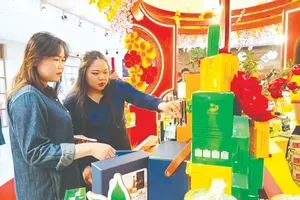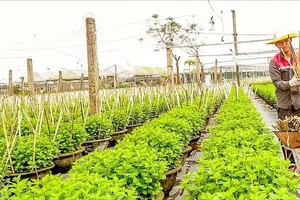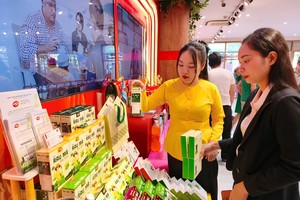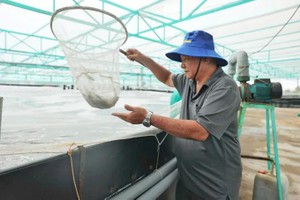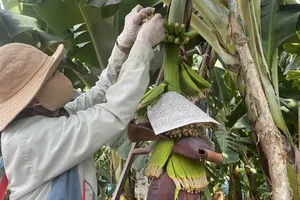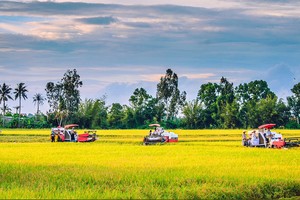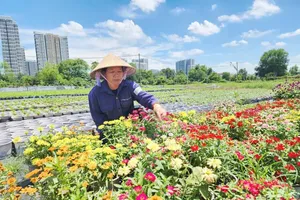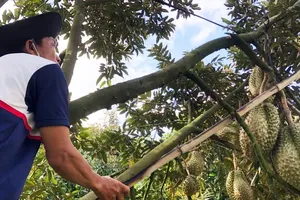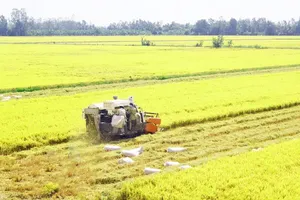In considering that growing passion fruits might make higher profits than growing coffee, a number of farmers in Gia Lai Province had cut down their coffee and rubber trees and then replaced them by passion fruits as not knowing that their decision could already contain high risks.
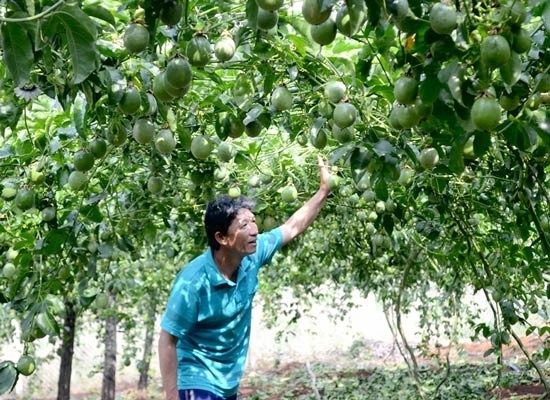
Mrs. Nguyen Thi Lua's family in Ia Kha Town of Ia Grai District in Gia Lai Province earns at average VND1.5 million a day from passion fruits. (Photo: SGGP)
According to recent references, with a price of VND10,000 per kilogram, the growing of passion fruit has made real profits. However, the price might rise at higher levels recently, sometimes up to VND28,000 per kilogram. As a result, farmers believed that passion fruit would be a kind of money-making plant and then they have flocked into growing them.
In August 2015, Mrs. Nguyen Thi Lua's family in Ia Kha Town of Ia Grai District in Gia Lai Province destroyed their rubber and coffee fields in intention to cultivate passion fruits in an area of 1 hectare with an investment capital up to VND200 million. Their passion fruits have been giving fruits and traders have come to bargain buying passion fruits for export to China. With current price, Mrs. Lua earns at average VND1.5 million a day. According to her words, passion fruits might produce at average 90 tons annually which creates an amount equivalent to 60 tons of coffee beans at current prices.
Meanwhile, in order to produce such an amount by coffee, she has to grow more than 10 hectares of coffee trees. This is the reason why her family has decided to abandon coffee trees for passion fruits. Her family has meanwhile already destroyed 3,000 more square meters of coffee trees in waiting for growing passion fruits in April.
Statistics show that there are around 40 hectares of passion fruits in Ia Grai District, mainly locates in area of Ia Ba Commune and Ia Kha Town. Meanwhile, along a section of Highway 19 which passes Mang Yang District, coffee trees have already been canceled and are now in waiting for being uprooted to prepare surface for passion fruits. Some households have cultivated passion fruits mixed in their rubber tree fields.
The 3,000 square-meter orchard of passion fruits belongs to Mr. Nguyen Van Thuc in Dak Jrang Commune in Mang Yang District which were grown in October last year is now in blossom. Earlier, there were coffee trees in this land area. He explained why he eradicated coffee trees to grow passion fruits, since other farmers easily earned money off it.
According to the Department of Agriculture and Rural Development of Mang Yang District, the district currently has an area of 180 hectares of passion fruits. Since the beginning of this year, the area of passion fruits has increased to 50 hectares and is expected to strongly enlarge in the future.
The Department of Cultivation and Plant Protection under the Department of Agriculture and Rural Development of Gia Lai Province said that cultivation of passion fruits in the province was totally spontaneous. Farmers flocked to cultivate passion fruits when they saw that passion fruits were bought at high prices. At present, there are around 301 hectares of passion fruits, of which in 2015 alone, the area of newly-grown passion fruits was 108 hectares. The area of passion fruits that are giving fruits is 143 hectares.
Farmers said that they grow passion fruit as it produces high profits. Cultivation mainly bases on experience and self-learning instead of methodical training. After farmers harvest passion fruits, traders go to their houses to buy them and prices are entirely decided by traders.
Mr. Dao Lan Hung, head of the Department of Agriculture and Rural Development of Ia Grai District, said that his district had not either had any project for passion fruit cultivation or encouraged farmers to expand the area of passion fruit because consumption of this kind of fruits remained unstable.
According to Mr. Ha Ngoc Uyen, head of the Department of Cultivation and Plant Protection of Gia Lai Province, there is not any factory that uses passion fruits as input material in the province.
Consumption hinges on traders who buy passion fruits then transport to other provinces. Therefore, the price of passion fruits is not steady and contains high risks. Growing passion fruits massively also causes the cultivated land of other crop plants to decrease, affecting agricultural project.
Without determining whether their soil is suitable for passion fruits, farmers may make pests develop strongly, causing loss to their crops. In addition, it will cause exhaustion, degradation and pollution to soil and imbalance in ecosystem.
